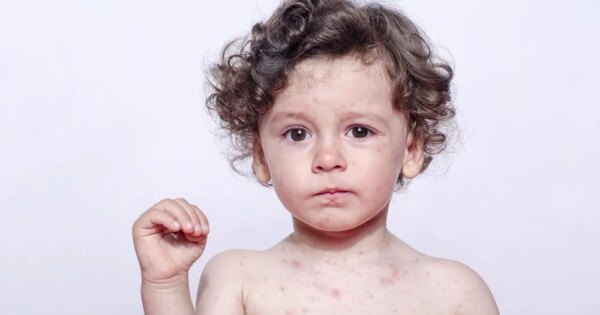During the colder months, it can be hard to pin down what exactly is causing your child’s runny nose and cough. While one of the most common culprits is a cold, often times the symptoms that accompany a cold or the flu, can also be signs of bronchitis. Bronchitis, which can be acute (short-term) or chronic (long-term), takes place when a child’s bronchial tubes, which carry air to their lungs, become inflamed, most often due to infection from a virus. When their bronchial tubes become inflamed, they swell and produce mucus. This not only makes it harder to breathe but also makes them cough.
Whereas acute bronchitis only lasts a few weeks, chronic bronchitis can last anywhere from several months to several years. Fortunately, unless there is a bacterial infection present, you don’t have to worry about giving your child antibiotics. Treatment for bronchitis instead takes the form of plenty of rest and fluids, as well as cold medication to help ease coughing, runny nose, and any other symptoms. To help parents get better informed on the symptoms of bronchitis, as well as seek the right treatment, and prevent it from happening in the first place, here’s a look at the most common bronchitis symptoms, causes, and treatment options.
Symptoms
Symptoms of bronchitis can look different from child to child and are also dependent on the kind of bronchitis (acute or chronic).
That said, below are the most common symptoms:
1. Dry or Mucus-Filled Cough
Pay close attention to the sound of your child’s cough. If it sounds particularly phlegmy or mucusy, it could be the result of an inflamed respiratory tract. Even if doesn’t turn out to be bronchitis, this type of cough is still worth having a doctor look at.
However, a persistent dry cough can also be indicative of bronchitis, especially if your child begins coughing up thick white, yellow, or greenish mucus.
2. Vomiting or Gagging
If you’ve ever been stuffed up with mucus, you know the gag reflex we’re talking about. It happens when you sniffle too hard and the resulting mucus triggers a gag reflex in your throat. Fun stuff!
Apart from mucus, if your child’s coughing becomes so intense that it also begins triggering a gag reflex, that could also be a sign of bronchitis.
3. Runny Nose (Before a Cough Starts)
Bronchitis can show itself even before your child begins coughing. In this case, it will appear in the form of a runny nose. Of course, many things can cause a runny nose, so just because your child has one, doesn’t mean they automatically have bronchitis. However, it’s still worth keeping tabs on.
If you notice that your child develops a cough after struggling with a runny nose, then it might be more reason for concern.
4. Chest Congestion or Pain
Due to bronchitis causing inflammation in your lungs, if your child is experiencing sudden pain or discomfort in their chest (where the lungs are situated) it could be symptomatic of bronchitis.
5. Cold Symptoms
This includes a slight fever, sore throat, back or muscle pain, headache, tiredness, and a general “down” feeling.
Bronchitis and the common cold can be hard to tell apart due to the fact that they share a lot of the same symptoms. While this isn’t the worst thing in the world because they both share similar treatments (plenty of rest, fluids, and cold medication as recommended by your doctor), if your child does show symptoms of a cold, it’s worth looking to see if they are experiencing any of the other symptoms listed in this article. These will help determine whether they are suffering from a cold or bronchitis.
6. Wheezing
If you notice your child making a whistling or hissing noise when they breathe, this could be a sign of an inflamed respiratory tract, and, by extension, bronchitis.
7. Cause: Acute Bronchitis
There are two kinds of bronchitis, acute and chronic, and each can be brought on by different circumstances.
Acute bronchitis comes on quickly and can cause severe symptoms, although it lasts only a few weeks. This is the most common kind of bronchitis, especially for children, with most people experiencing it at some points in their lives. It’s usually caused by some kind of virus and, as explained above, may happen along with or after a cold or other respiratory infection.
The viruses that cause bronchitis are usually spread:
- when someone with bronchitis coughs and sends infected droplets into the air, or
- when someone touches their mouth, eyes, or nose after contact with respiratory fluids from an infected person
Acute bronchitis can also be caused by bacteria, dust, allergens, strong fumes, or tobacco smoke.
8. Cause: Chronic Bronchitis
Chronic bronchitis, while rare in children, can last for months to years. Unlike acute bronchitis, 80-percent of the time, chronic bronchitis is caused by smoking. In the cases of children who have chronic bronchitis, it’s usually the result of parents who smoke around them or being in an environment with constant pollutants, allergens, or chemicals.
Due to chronic bronchitis causing your bronchial tubes to stay inflamed for longer periods of time, people with chronic bronchitis are more likely to experience more serious bacterial infections of the airway and lungs, such as pneumonia.
9. Higher Risk
Regardless of the kind, generally speaking, bronchitis is more likely to affect children who have:
- Chronic sinusitis
- Allergies
- Asthma
- Enlarged tonsils and adenoids
- Exposure to secondhand smoke
10. Diagnosing Bronchitis
Treatments will depend on your child’s symptoms, age, and general health. It will also depend on the kind and severity of their bronchitis.
Most of the time, your doctor will be able to diagnose acute bronchitis with the help of your child’s medical history and a physical exam. However, to help rule out other similar health problems (such as asthma or pneumonia), your doctor may need to also look at chest x-rays, pulse oximetry (measures the amount of oxygen in blood), and sputum and nasal discharge samples.
11. Treatment Options
However, in nearly all cases (even children who have been coughing for longer than 8 to 10 days), antibiotics should not be used to treat acute bronchitis. This is because most of the infections that cause bronchitis are caused by viruses, not bacteria. In fact, sometimes the use of antibiotics can actually be harmful.
Treatment, instead, is often aimed at easing the severity of symptoms and may include:
- plenty of liquids
- plenty of rest
- over-the-counter or prescription cough medicine (only for older kids and teenagers, as recommended by your doctor)
- bronchodilators (used in some cases to help the bronchial tubes and clear mucus)
- humidified oxygen (often only to babies who have trouble breathing, are dehydrated, or seem persistently tired)
12. Prognosis and Prevention
Fortunately, most children with acute bronchitis get better without any problems. But it’s still important to recognize and manage it as quickly as possible. If left untreated, it can sometimes lead to more serious infections like pneumonia.
Children or teens with chronic bronchitis should stay away from whatever it is that is causing the inflation. For cigarette smoke, this means quitting or staying away from second-hand smoke. The same goes for parents, who should either quit or not smoke around their children.
Although the best treatment, as with any other illness, is prevention. This is why it’s important to teach your child the importance of covering their mouth (preferably with their sleeve instead of their hand) when they cough or sneeze, as well as washing their hands. This not only helps them avoid catching things like bronchitis, but also helps stop the spreading of it to other children.















